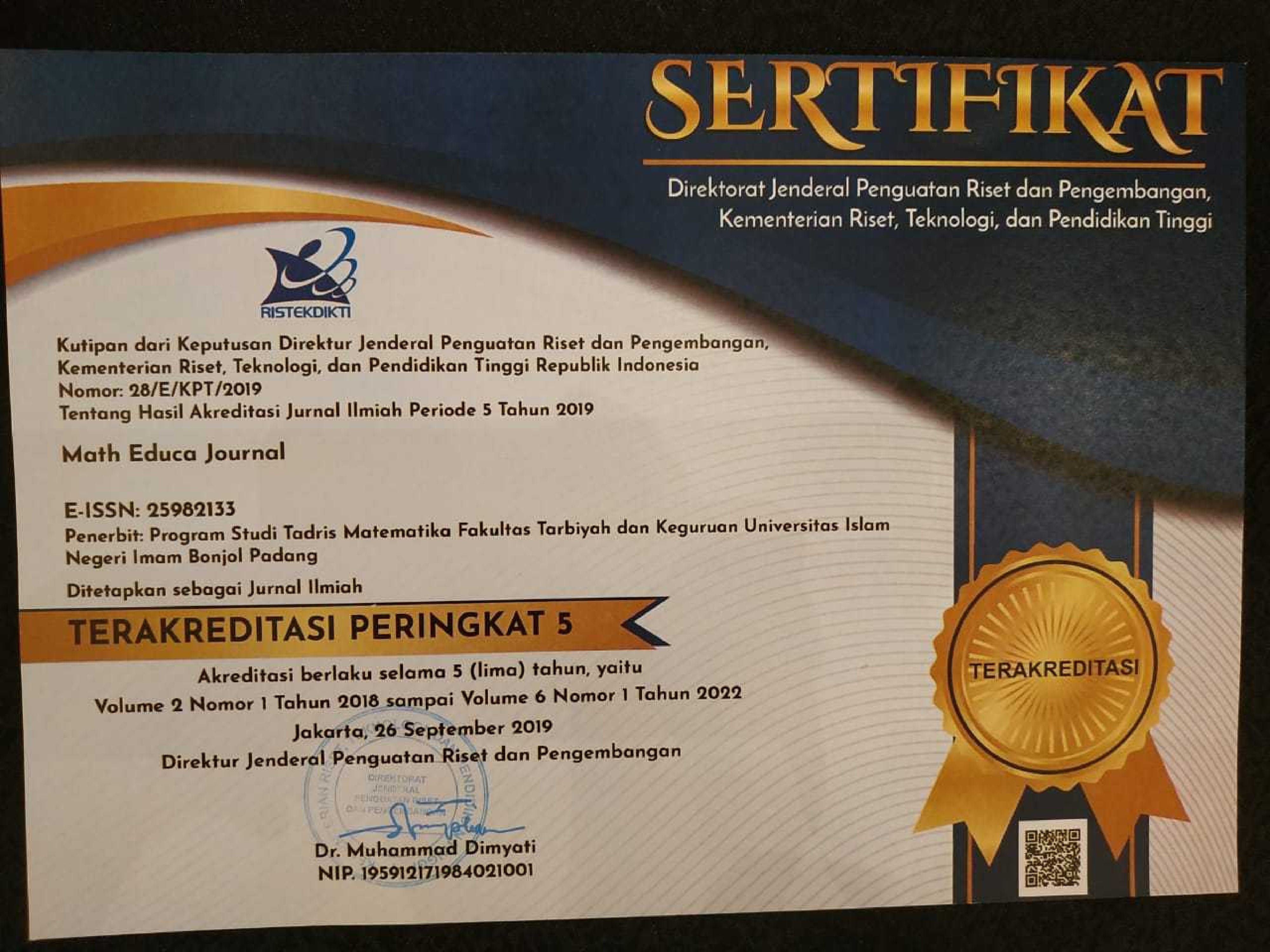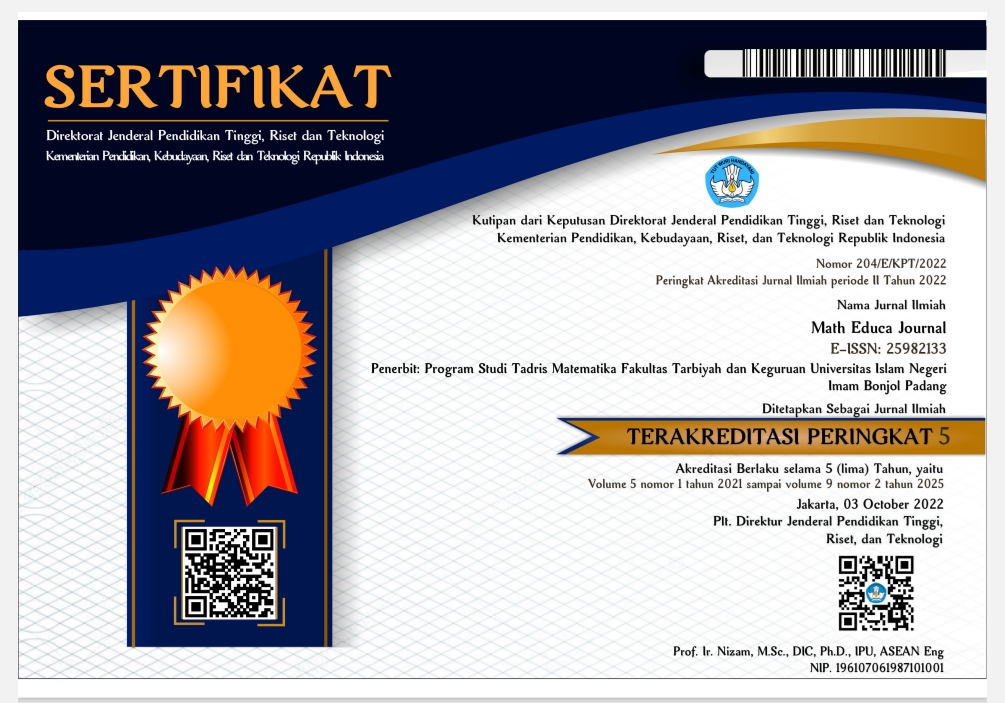KONTROL ADAPTIF PADA MODEL PENYEBARAN KOLERA DENGAN ADANYA KETIDAKPASTIAN PARAMETER
Abstract
In this paper the number of humans infected with cholera was controlled under the uncertainty in cholera model parameters. The aim of this research is to design an adaptive control so that the number of infected humans decreases. To achieve this goal, an adaptive controller was proposed to a deterministic model for the transmission of cholera involving five state variables (susceptible humans, infected humans, quarantined humans, recovered humans, and bacterial concentration) and one input control variable, i.e, the proportion of quarantined humans. A control law was designed such that the number of infected humans was decreased tracking the given reference function. The tracking error convergence were analyzed by employing the Lyapunov theorem. The performance of the proposed controller was evaluated through numerical simulations. The results show that the adaptive controller designed to the model ensures the tracking error convergence such that the number of infected humans has declined.
Keywords
Full Text:
PDFReferences
Aghajanzadeh, O., Sharifi, M., Tashakori, S., & Zohoor, H. (2017). Nonlinear adaptive control method for treatment of uncertain hepatitis B virus infection. Biomedical Signal Processing and Control, 38, 174–181.
Ali, M., Nelson, A. R., Lena Lopez, A., & Sack, D. A. (2015). Updated Global Burden of Cholera in Endemic Countries. 9(6). https://doi.org/10.1371/journal.pntd.0003832
Ayu, R. W. S. (2021). Desain kendali adaptif pada model penyebaran demam berdarah dengan melibatkan fase akuatik Nyamuk. 1(1), 1–10. https://ejurnal.unisap.ac.id/index.php/leibniz/article/view/38
Capasso, V., & Paveri-Fontana, S. (1979). A mathematical model for the 1973 cholera epidemic in the European Mediterranean region. Revue d’épidémiologie et de Santé Publique, 27(2), 121–132. https://europepmc.org/article/med/538301
Cui, an, Wu, Z., & Zhou, X. (2014). Mathematical Analysis of a Cholera Model with Vaccination. https://doi.org/10.1155/2014/324767
Lemos-Paião, A. P., Silva, C. J., & Torres, D. F. M. (2017). An epidemic model for cholera with optimal control treatment. Journal of Computational and Applied Mathematics, 318, 168–180. https://doi.org/10.1016/j.cam.2016.11.002
Moradi, H., Sharifi, M., & Vossoughi, G. (2015). Adaptive robust control of cancer chemotherapy in the presence of parametric uncertainties: A comparison between three hypotheses. Computers in Biology and Medicine, 56, 145–157. https://doi.org/https://doi.org/10.1016/j.compbiomed.2014.11.002
Sharifi, M., & Moradi, H. (2019). Nonlinear composite adaptive control of cancer chemotherapy with online identification of uncertain parameters. Biomedical Signal Processing and Control, 49(360–374). https://doi.org/https://doi.org/10.1016/j.bspc.2018.07.009
Slotine, J.-J. E., & Li, W. (1991). APPLIED NONLINEAR CONTROL.
Torres Codeço, C. (2001). Endemic and epidemic dynamics of cholera: the role of the aquatic reservoir. BMC Infectious Diseases, 1(1), 1. http://www.biomedcentral.com/1471-2334/1/1
WHO. (2019). Cholera Situation in Yemen. May, 22765273. http://www.emro.who.int/images/stories/csr/documents/Cholera_situation_update_Yemen_February_2019.pdf?ua=1
Refbacks
- There are currently no refbacks.

This work is licensed under a Creative Commons Attribution-NonCommercial-ShareAlike 4.0 International License.
The Journal Space of the Mathematics Education Department
Faculty of Education and Teacher Training
State Islamic University of Imam Bonjol Padang
Email: mej.uinibpadang@gmail.com

Math Educa Journal is licensed under a Lisensi Creative Commons Atribusi-NonKomersial 4.0 Internasional.
Based on a work at https://ejournal.uinib.ac.id/jurnal/index.php/matheduca.
All rights reserved p-ISSN: 2580-6726 | e-ISSN: 2598-2133





